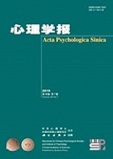|
|
WORD FLUENCY: AGE DIFFERENCE IN ADULTHOOD AND RELATIONSHIP WITH WORD MEMORY
Xu Shulian,Sun Hongke,Wu Zhiping Institute of Psychology, Academia Sinica
Lang Fang Teacher's Special School,Hebei
1989, 21 (04):
3-11.
78 cases of young, middle-aged and old healthy adults were tested tostudy age differences in speaking, reading and writing word fluency andits relation to word memory. The results indicated that: (1 )most abilitiesof word fluency and word memory declined in the elderly, however, theperformances on two tests of reading colored word and naming word col-or in Stroop Test started to decline in middle-age; (2 )besides age fact-or, the performances of word fluency were also influenced by the educa-tional levels of subjects and the contents of tests, and there existed inter-actions between age and educational level or that between age and test.The lower the educational level of subjects the more difficult the testtask was, the larger the age difference (3 ) the correlations betweenword memory and tasks of word fluency were significant. A possibleexplanation is that both kinds of tests mainly consist of memory andattention processes; and(4 )females did much better than males in the twocolor naming tests and the word generation of a given category task.
Related Articles |
Metrics
|




